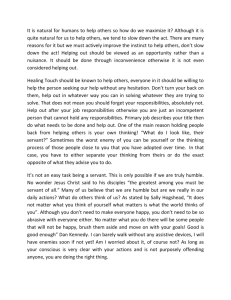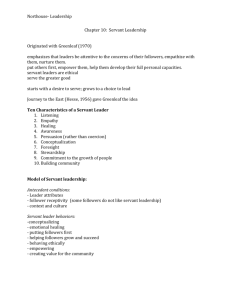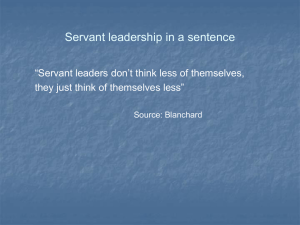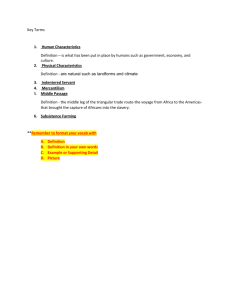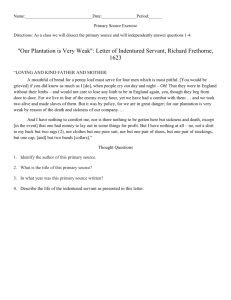English IV – Semester 1 Exam Review 2014
advertisement
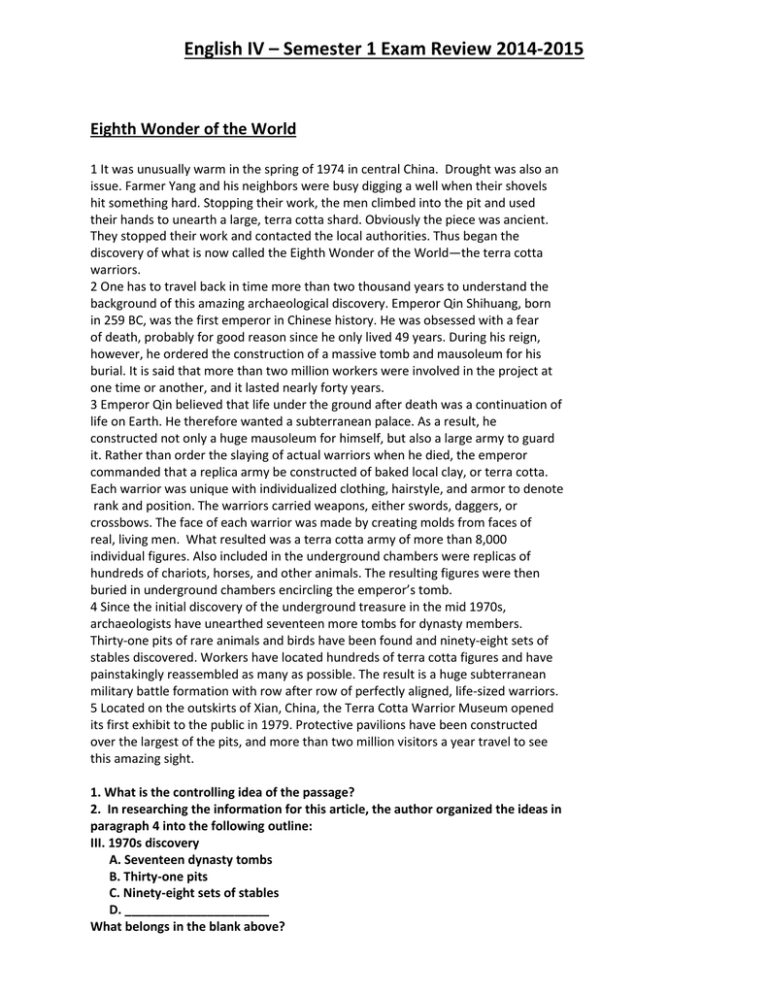
English IV – Semester 1 Exam Review 2014-2015 Eighth Wonder of the World 1 It was unusually warm in the spring of 1974 in central China. Drought was also an issue. Farmer Yang and his neighbors were busy digging a well when their shovels hit something hard. Stopping their work, the men climbed into the pit and used their hands to unearth a large, terra cotta shard. Obviously the piece was ancient. They stopped their work and contacted the local authorities. Thus began the discovery of what is now called the Eighth Wonder of the World—the terra cotta warriors. 2 One has to travel back in time more than two thousand years to understand the background of this amazing archaeological discovery. Emperor Qin Shihuang, born in 259 BC, was the first emperor in Chinese history. He was obsessed with a fear of death, probably for good reason since he only lived 49 years. During his reign, however, he ordered the construction of a massive tomb and mausoleum for his burial. It is said that more than two million workers were involved in the project at one time or another, and it lasted nearly forty years. 3 Emperor Qin believed that life under the ground after death was a continuation of life on Earth. He therefore wanted a subterranean palace. As a result, he constructed not only a huge mausoleum for himself, but also a large army to guard it. Rather than order the slaying of actual warriors when he died, the emperor commanded that a replica army be constructed of baked local clay, or terra cotta. Each warrior was unique with individualized clothing, hairstyle, and armor to denote rank and position. The warriors carried weapons, either swords, daggers, or crossbows. The face of each warrior was made by creating molds from faces of real, living men. What resulted was a terra cotta army of more than 8,000 individual figures. Also included in the underground chambers were replicas of hundreds of chariots, horses, and other animals. The resulting figures were then buried in underground chambers encircling the emperor’s tomb. 4 Since the initial discovery of the underground treasure in the mid 1970s, archaeologists have unearthed seventeen more tombs for dynasty members. Thirty-one pits of rare animals and birds have been found and ninety-eight sets of stables discovered. Workers have located hundreds of terra cotta figures and have painstakingly reassembled as many as possible. The result is a huge subterranean military battle formation with row after row of perfectly aligned, life-sized warriors. 5 Located on the outskirts of Xian, China, the Terra Cotta Warrior Museum opened its first exhibit to the public in 1979. Protective pavilions have been constructed over the largest of the pits, and more than two million visitors a year travel to see this amazing sight. 1. What is the controlling idea of the passage? 2. In researching the information for this article, the author organized the ideas in paragraph 4 into the following outline: III. 1970s discovery A. Seventeen dynasty tombs B. Thirty-one pits C. Ninety-eight sets of stables D. _____________________ What belongs in the blank above? from The Beggar and the King Winthrop Parkhurst CHARACTERS: THE KING OF A GREAT COUNTRY HIS SERVANT A BEGGAR 1 SCENE: A chamber in the palace overlooks a courtyard. The season is midsummer. The windows of the palace are open, and from a distance there comes the sound of a man's voice crying for bread. THE KING -sits in a golden chair. A golden crown is on his head, and he holds in his hand a sceptre which is also of gold. A SERVANT -stands by his side, fanning him with an enormous fan of peacock feathers. 2 THE BEGGAR: [Outside.] Bread. Bread. Bread. Give me some bread. 3 THE KING: [Languidly.] Who is that crying in the street for bread? 4 THE SERVANT: [Fanning.] O king, it is a beggar. 5 THE KING: Why does he cry for bread? 6 THE SERVANT: O king, he cries for bread in order that he may fill his belly. 7 THE KING: I do not like the sound of his voice. It annoys me very much. Send him away. 8 THE SERVANT: [Bowing.] O king, he has been sent away. 9 THE KING: If that is so, then why do I hear his voice? 10 THE SERVANT: O king, he has been sent away many times, yet each time that he is sent away, he returns again, crying louder than he did before. 11 THE KING: He is very unwise to annoy me on such a warm day. He must be punished for his impudence. Use the lash on him. 12 THE SERVANT: O king, it has been done. 13 THE KING: Then bring out the spears. 14 THE SERVANT: O king, the guards have already bloodied their swords many times driving him away from the palace gates. But it is of no avail. 15 THE KING: Then bind him and gag him if necessary. If need be cut out his tongue. I do not like the sound of the fellow's voice. It annoys me very much. 16 THE SERVANT: O king, thy orders were obeyed, even yesterday. 17 THE KING: [Frowning.] No. That cannot be. A beggar cannot cry for bread who has no tongue. 18 THE SERVANT: Behold he can--if he has grown another. 19 THE KING: What! Why, men are not given more than one tongue in a lifetime. To have more than one tongue is treason. 20 THE SERVANT: If it is treason to have more than one tongue, O king, then is this beggar surely guilty of treason. 21 THE KING: [Pompously.] The punishment for treason is death. See to it that the fellow is slain. And do not fan me so languidly. I am very warm. 22 THE SERVANT: [Fanning more rapidly.] Behold, O great and illustrious king, all thy commands were obeyed, even yesterday. 23 THE KING: How! Do not jest with thy king. 24 THE SERVANT: If I jest, then there is truth in a jest. Even yesterday, O king, as I have told thee, the beggar which thou now hearest crying aloud in the street was slain by thy soldiers with a sword. 25 THE KING: Do ghosts eat bread? Forsooth, men who have been slain with a sword do not go about in the streets crying for a piece of bread. 26 THE SERVANT: Forsooth, they do if they are fashioned as this beggar. 27 THE KING: Why, he is but a man. Surely he cannot have more than one life in a lifetime. 28 THE SERVANT: Listen to a tale, O king, which happened yesterday. 29 THE KING: I am listening. 30 THE SERVANT: Thy soldiers smote this beggar for crying aloud in the streets for bread, but his wounds are already healed. They cut out his tongue, but he immediately grew another. They slew him, yet he is now alive. 31 THE KING: Ah! that is a tale which I cannot understand at all. 32 THE SERVANT: O king, it may be well. 33 THE KING: I cannot understand what thou sayest, either. 34 THE SERVANT: O king, that may be well, also. 35 THE KING: Thou art speaking now in riddles. I do not like riddles. They confuse my brain. 36 THE SERVANT: Behold, O king, if I speak in riddles, it is because a riddle has come to pass. . . Winthrop Parkhurst’s play was originally written and performed in 1919. 1. Paragraph 24 is important to the play because it shows that the beggar — 2. The dialogue between the servant and the king reveals that the king — 3. Complete the following analogy: president : secretary :: king : _______ 4. The playwright uses the stage directions in paragraph 21 to suggest that the king — 5. How would you describe the character of the king? Support your answer with evidence from the selection. 6. What statement reflects the social practices of the time period reflected in this scene? 7. Which line of dialogue provides the best evidence that the servant is obedient? 8. Which of the following statements best represents the main idea of paragraph 3? O Darling Room by Sir Alfred Lord Tennyson I O darling room, my heart's delight, Dear room, the apple of my sight, With thy two couches soft and white, There is no room so exquisite, No little room so warm and bright Wherein to read, wherein to write. II For I the Nonnenwerth1 have seen, And Oberwinter's vineyards green, Musical Lurlei; and between The hills to Bingen have I been, Bingen in Darmstadt, where the Rhene Curves towards Mentz, a woody scene. III Yet never did there meet my sight, In any town, to left or right, A little room so exquisite, With two such couches soft and white; 6 12 Not any room so warm and bright, Wherein to read, wherein to write. 18 1Nonnenwerth, Oberwinter, Lurei, Bingen, Darmstadt, and Mentz are places and cities in Germany. From The Suppressed Poems of Alfred Lord Tennyson 1830-1868, Edited by J.C. Thomson, Originally published in 1904 by J. Thomson. 1. In line 2, the poet uses a metaphor to ― 2. The break between stanzas one and two serves the purpose of ― 3. Complete the following analogy based upon this poem: hills: Bingen :: woods : _________ 4. By including the second stanza of the poem, the poet — VOCABULARY: You need to know all the figurative language terms and definitions we have been studying all year. We will review them again on the days we complete our test review. We will review and prepare a couple of days before the exam. Please be prepared to discuss these questions in class. You may also take notes in class to help you prepare for the exam. Study hard! Smile! Christmas is almost here! =)

